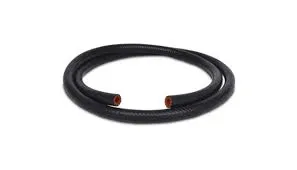reduced barrier ac hose
Nov . 12, 2024 03:52 Back to list
reduced barrier ac hose
Understanding Reduced Barrier AC Hoses A Key to Efficient Vehicle Performance
Advanced engineering has transformed the way we think about automotive components, particularly when it comes to air conditioning systems. One key innovation in this domain is the reduced barrier AC hose. This specialized component plays a critical role in enhancing the efficiency of vehicle air conditioning systems, thus improving overall vehicle performance and environmental sustainability.
What is a Reduced Barrier AC Hose?
A reduced barrier AC hose is designed specifically to minimize refrigerant leakage. Traditional hoses often allow small amounts of refrigerant to permeate through the hose material, which can lead to inefficiencies and the potential for global warming as the refrigerants often used are potent greenhouse gases. By contrast, reduced barrier hoses are crafted with advanced materials and technologies that significantly lower the rate of permeation, leading to more efficient and environmentally safe air conditioning systems.
Benefits of Reduced Barrier AC Hoses
1. Improved Refrigerant Retention One of the primary benefits of reduced barrier AC hoses is their ability to retain refrigerants more effectively than conventional hoses. This leads to a more consistent cooling performance, as the system does not have to work as hard to compensate for lost refrigerants. Consequently, this improves the overall efficiency of the vehicle's air conditioning system.
reduced barrier ac hose

2. Environmental Impact With concerns about climate change escalating, the automotive industry is under increasing pressure to reduce emissions, including those from air conditioning systems. The use of reduced barrier AC hoses minimizes refrigerant leakage, thereby supporting manufacturers in meeting stringent environmental regulations and contributing to sustainability efforts.
3. Cost Efficiency While reduced barrier hoses may have a higher initial cost, the long-term savings are significant. Reduced leakage means lower refrigerant charges are needed over the lifespan of the vehicle, translating to reduced maintenance costs and increased vehicle resale value due to an efficiently functioning AC system.
4. Enhanced Durability The materials used in reduced barrier AC hoses are designed to withstand greater thermal and mechanical stresses. This durability extends the lifespan of the hose, reducing the frequency of replacements and repairs, which is especially beneficial in both passenger and commercial vehicles subjected to varying operating conditions.
5. Higher Performance Reduced barrier AC hoses contribute to improved overall vehicle performance. By enhancing the efficiency of the air conditioning system, these hoses allow the engine to perform optimally by reducing the load associated with cooling systems. This can result in better fuel economy and engine performance.
Conclusion
The advent of reduced barrier AC hoses represents a significant leap forward in automotive technology. By addressing the vital issues of refrigerant leakage and environmental sustainability, these hoses offer a multitude of benefits, including improved system efficiency, reduced environmental impact, and enhanced vehicle performance. As consumer awareness regarding energy efficiency and environmental stewardship continues to grow, the importance of such innovations in the automotive sector cannot be overstated. Reduced barrier AC hoses not only serve as a stepping stone toward more sustainable vehicle designs but also play a crucial role in boosting the functionality and longevity of vehicle air conditioning systems. As the automotive landscape continues to evolve, the integration of advanced technologies like reduced barrier hoses will undoubtedly pave the way for a greener and more efficient future in transportation.
